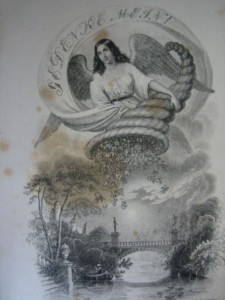Franzensbad, 31. Juli 1856
Theuerster Freund!
Wahrscheinlich haben Sie schon durch Ida die Angelegenheit erfahren, in welcher ich Ihnen heute schreibe. Herr Pfautsch will mein Portrait in dem Taschenbuch „Gedenke mein“ erscheinen lassen und besagtem Conterfei auch meine Biographie beigeben. Gegen eine solche habe ich mich nun entschieden erklärt. Bin ich einmal todt und es will sich Jemand die Mühe nehmen, meine Biographie zu schreiben, so kann ich es, leider! nicht hindern, aber so lange ich noch auf Erden wandle, fühle ich nicht den mindesten Beruf, vor dem Publikum eine Art Generalbeichte abzulegen. Biographien noch lebender Personen müssen entweder lügen- oder lückenhaft sein; wenn dieß nicht, sind sie noch Schlimmeres: eine Entweihung, die man seinem eigensten Wesen zufügt, um die Neugier und Klatschsucht der plumpen Masse zu befriedigen. … Ich habe mich also nur dazu verstanden, einige biographische Notizen zu liefern. Diesen flüchtigen Umrissen meines äußeren Lebens wäre es aber passend, ein Bild meines geistigen Seins beizufügen … Mein guter, treuer Freund! Sie erzeigen mir einen großen Liebesdienst und ersparen mir wahrscheinlich bedeutende Unannehmlichkeiten, wenn Sie die Arbeit, um die es sich hier handelt, übernehmen. …
Leben Sie wohl, erfüllen Sie meine Bitte und gedenken Sie meiner in Freundschaft. Ihre Betty Paoli

Leopold Kompert’s newspaper project for the lower classes
In 1850, the Jewish author Leopold Kompert, born in Bohemia in 1822, contacted [Betty] Paoli to present her with his project for a people’s newspaper aimed at the education of the lower classes. Kompert had been the chief editor of the Feuilleton – the features section – of the Austrian newspaper Lloyd from 1848 and intended to publish his people’s paper as a supplement to the Lloyd. This newspaper was financed by aristocrats and provided a platform for moderate conservative voices. […]
The structure and line of argument in Paoli’s letter […] suggest that Paoli expected Kompert to include her letter in the Feuilleton of the Lloyd, which was to provide his project with publicity and funding. […]
With reference to the newspaper project, Paoli writes: „If it did not appear too presumptuous, I would say: thank you [for the idea] in the name of those, who are not yet capable of grasping the value of the gift presented to them.“ Paoli’s premise here is that the ‘public’ to which Kompert addresses himself was not yet able to appreciate his well-intended attempt at education. Here the bourgeois notion of superiority is expressed, an elitist assumption that enables members of the educated classes not only to distinguish between their position and the lower, that is, uneducated classes, but also to assert their position as intellectual and educational benefactors. At the same time, the importance of educational issues is confirmed by Paoli, and the possibility of individual and general educational development in the future is implied […]
Karin S. Wozonig: „Philanthropy and Fear. Austrian Bourgeoisie and the Social Question.“ In: I.M. van den Broek, C.A.L. Smit and D. J. Wolffram (eds): Imagination and commitment. Representations of the social question. Groningen Studies in Cultural Change. Leuven: Peeters 2010. 19-36

